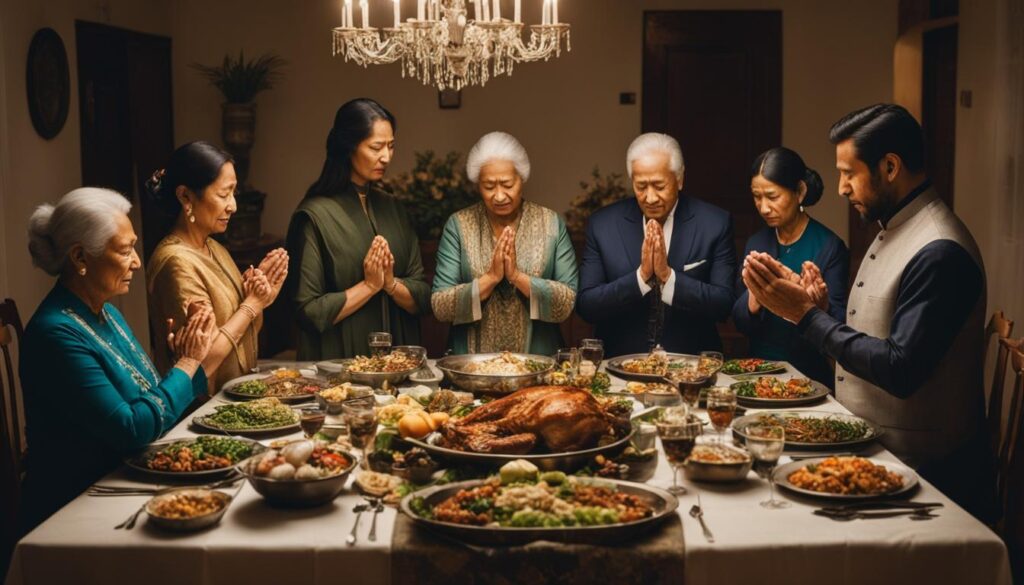Saying grace before meals is a cherished tradition that has been passed down through generations. It is a moment of pause and reflection, a time to express gratitude for the nourishment that is about to be received. Mealtime prayer holds deep significance, not only in religious circles but also in fostering unity and gratitude within families and communities.
In this article, we will delve into the rich tradition of saying grace before meals and explore the various ways in which this practice can be incorporated into daily routines. From traditional prayers to personalized expressions of thanksgiving, we will discover how grace before meals can create sacred and meaningful moments at the dining table.
Key Takeaways:
- Traditional prayer before meals is a way to express gratitude for the nourishment received.
- Saying grace before meals fosters unity and gratitude within families and communities.
- Grace before meals holds deep religious significance, acknowledging dependence on a higher power.
- Building a mealtime prayer tradition instills values of gratitude and reverence.
- Mealtime prayers can be tailored to specific occasions and reflect the special significance of the meal being shared.
The Significance of Saying Grace
Saying grace before meals holds deep religious significance. It is a way for individuals to acknowledge their dependence on a higher power and express gratitude for the nourishment provided. This act of prayer before eating also fosters a sense of mindfulness and appreciation for the blessings received.
Expressing Gratitude and Dependence
Religious mealtime blessings, also known as pre-meal prayers or grace prayers, are an integral part of many spiritual traditions. They serve as a reminder that the food we consume is not merely a result of our efforts but a gift from a higher power. By uttering a prayer before each meal, individuals humbly recognize their dependence on divine providence.
The act of saying grace is an opportunity to express gratitude for the nourishment and sustenance provided. It compels individuals to pause, reflect, and appreciate the abundance that surrounds them. By acknowledging the source of their blessings, be it God or any other divine entity, individuals cultivate a spirit of thankfulness that extends beyond the dinner table.
Additionally, saying grace before meals promotes a sense of mindfulness and presence. It encourages individuals to slow down, to be fully present in the moment, and to savor the food before them. This simple act of pausing and expressing gratitude enhances the dining experience by fostering a deeper connection with the food, the people around the table, and the spiritual aspect of the mealtime ritual.
“Bless us, O Lord, and these Thy gifts which we are about to receive from Thy bounty. Through Christ, our Lord. Amen.”
Fostering Unity and Reverence
Pre-meal prayer, or grace, brings individuals together in a shared moment of reverence. It creates an atmosphere of unity and connection, reminding everyone at the table of their common values and beliefs. Whether recited in silence or aloud, grace before a meal serves as a unifying force that bridges spiritual, cultural, and generational divides.
By saying grace together, families and communities cultivate a sense of togetherness and reinforce the bonds that tie them. It becomes a time to pause, reflect, and express gratitude as a collective, reinforcing the shared values and traditions within the group.
The significance of saying grace extends beyond the immediate act of prayer. It sets the tone for the entire meal and infuses it with a sense of sacredness. The ritual of grace before meals transforms ordinary eating into a purposeful and meaningful experience, reminding individuals of the interconnectedness of body, mind, and spirit.
A Visual Representation
To illustrate the significance of saying grace, consider the following table:
|
The Significance of Saying Grace
|
|—|
|Expressing Gratitude and Dependence|
|Fostering Unity and Reverence|

Building a Mealtime Prayer Tradition
Building a mealtime prayer tradition is a beautiful way to create a sacred and meaningful atmosphere at the dining table. By incorporating grace before meals into daily routines, families can instill values of gratitude, unity, and reverence for the blessings received. This section provides practical steps and ideas to help you establish and maintain a mealtime prayer tradition that will enrich your dining experience.
- Be Intentional: Start by setting aside a specific time for mealtime prayers. Whether it’s before every meal or reserved for special occasions, make a conscious effort to gather together and express gratitude before eating.
- Choose a Classic Prayer: Consider using a classic prayer before eating, such as the Lord’s Prayer or the Prayer of St. Francis. These timeless prayers have been passed down through generations and carry a depth of meaning that resonates with many.
- Personalize Your Prayer: While classic prayers are meaningful, don’t hesitate to personalize your grace before meals. Speak from the heart, expressing gratitude for specific blessings and acknowledging the uniqueness of the meal and the individuals gathered at the table.
- Involve Everyone: Encourage all family members to participate in saying grace. Let each person take turns leading the prayer or contribute their own heartfelt words of thanksgiving. This inclusivity promotes a sense of unity and shared responsibility.
- Create a Ritual: Establish a ritual around mealtime prayers to make them feel special. Light a candle or hold hands together as you say grace. These small gestures can enhance the sacredness of the moment and create a sense of continuity.
- Reflect on the Blessings: After saying grace, take a moment to reflect on the blessings you’re grateful for. Encourage open conversation about what each person is thankful for, fostering a spirit of appreciation and connection.
- Make It a Learning Opportunity: Use mealtime prayers as a chance to teach children about gratitude, spirituality, and cultural traditions. Explain the significance of grace before meals and the power of expressing thankfulness.
Incorporating grace before meals into your family’s routine can bring a sense of reverence, mindfulness, and togetherness to the dining table. The act of sharing a meal becomes more than just nourishment for the body; it becomes a sacred ritual that strengthens bonds and cultivates a spirit of gratitude.

“Saying grace before meals is a powerful way to center ourselves, acknowledge the blessings we have, and bring intention to the act of eating.”
Mealtime Prayers for Every Occasion
Mealtime prayers are a cherished tradition that adds a touch of reverence and gratitude to our dining experiences. Whether it’s a simple prayer of thanks or a prayer that reflects the significance of a special occasion, saying grace before eating brings a sense of sacredness to the table.
Here, we have compiled a collection of mealtime prayers for various occasions and situations. These prayers can serve as a guide when you want to offer a traditional dinner blessing or a heartfelt mealtime prayer:
1. Prayer of Gratitude
Dear Lord, we gather together today to break bread and share joyous moments. We are grateful for the food before us, blessed by Your hands. May this meal nourish our bodies, hearts, and souls. Amen.
2. Prayer for Family Gatherings
Heavenly Father, as we gather around this table with our loved ones, we thank You for the precious gift of family. May this meal strengthen the bonds among us and fill our hearts with love and joy. Amen.
3. Prayer for Celebrations
Oh Lord, as we come together to celebrate this special occasion, we lift our hearts in gratitude. May this meal be a reflection of the joy and blessings You have bestowed upon us. Amen.
4. Prayer for Healing
Merciful Father, we come before You seeking healing and restoration. As we partake in this meal, we ask for Your powerful touch to bring wholeness to our bodies and souls. Amen.
5. Prayer for New Beginnings
Dear God, as we embark on this new journey, we seek Your guidance and blessings. We thank You for this meal, which symbolizes the nourishment we receive from You as we embrace new beginnings. Amen.
These are just a few examples of the mealtime prayers you can incorporate into your life. Feel free to personalize them or create your own heartfelt expressions of gratitude. Saying grace before meals not only nourishes our bodies but also our spirits, fostering a deeper connection with the Divine and each other.

Through the act of saying grace before eating, we honor the traditions of our ancestors and create a sacred space for blessings to flow. So, the next time you gather around the table, take a moment to pause, offer a mealtime prayer, and embrace the grace that surrounds you.
Praying for Others While Saying Grace
When we say grace before meals, it’s not just an opportunity to express gratitude for the food on our plates. It’s also a moment to extend our prayers and blessings to those around us. By incorporating prayers for family, friends, and those in need, we cultivate a spirit of compassion and empathy that transcends the confines of our own dinner table.
A Gesture of Love
Saying grace after meals not only nourishes our bodies but also nourishes our relationships. It’s a chance to thank the people who have touched our lives and express our love and appreciation for them. As we gather around the evening meal, let us remember those dear to us and offer thanks for the joy, support, and love they bring into our lives.
A Prayer for Unity
Grace before meals is an opportunity to acknowledge the interconnectedness of humanity and the importance of community. When we pray for others, we strengthen the bonds that hold us together, fostering a sense of unity and shared purpose. It’s a reminder that we are part of something bigger than ourselves and that we have a responsibility to lift each other up.
“As we gather around our table, we lift up our voices in prayer, thanking God for the gift of our family and friends. May their lives be filled with love, joy, and blessings. Amen.”
Thoughts for Those in Need
While enjoying our evening meal, we can’t ignore the challenges and hardships faced by others. Saying grace after meals gives us an opportunity to remember those who are hungry, lonely, or in need of comfort. Let us give thanks for the abundance we have and pray for the well-being and peace of all those who are less fortunate.
Praying with Purpose
As we embrace the tradition of saying grace before meals, let us remember that our prayers have the power to make a difference in the lives of others. With each prayerful word, we manifest our desire for the well-being and happiness of those we hold dear. In this simple act, we become vessels of love and compassion, spreading blessings and grace to all.

Let our grace after meals be a moment of connection, where we not only nourish our bodies but also feed the souls of those around us. Through prayers for family, friends, and those in need, we reinforce our bonds of love and compassion, creating a more harmonious and caring world.
Grace Prayer Scriptures
When it comes to saying grace before meals, incorporating scripture can add a deeper spiritual dimension to the act. Drawing inspiration from biblical verses allows individuals and families to connect with their faith and express gratitude from a biblical perspective. Two powerful scriptures that can be reflected upon during grace prayers are Psalm 136 and 1 Thessalonians 5:18.
The food as a symbol in Psalm 136 highlights the recognition of God’s provision and sustenance in our lives. This psalm beautifully portrays the everlasting love and faithfulness of the Creator by acknowledging how everything we receive is ultimately from God’s hand. Including verses from Psalm 136 in grace prayers helps us focus on the symbolic nature of food as a gift and prompts us to be grateful for the blessings we enjoy.
“Give thanks to the Lord, for he is good. His love endures forever. Give thanks to the God of gods. His love endures forever. Give thanks to the Lord of lords: His love endures forever. Give thanks to the God of heaven: His love endures forever.”
Additionally, 1 Thessalonians 5:18 serves as a reminder to express gratitude in all circumstances, not just when things go according to plan. Incorporated into grace prayers, this verse encourages individuals and families to adopt an attitude of thankfulness, even during challenging times.
“Give thanks in all circumstances; for this is God’s will for you in Christ Jesus.”
By reflecting on these grace prayer scriptures, individuals and families can elevate their gratitude and deepen their connection with their faith during mealtime. Including these verses in grace prayers can bring spiritual richness and a greater sense of reverence to the act of giving thanks for the nourishment before us.
https://www.youtube.com/watch?v=OMerO0jeOGQ
Saying Grace While Dining Out
Saying grace while dining out allows us to extend the tradition beyond the confines of our homes and into public spaces. It provides a beautiful opportunity to express gratitude not only for the meal but also for the hands that prepared it. Whether enjoying a special occasion or simply grabbing a quick bite, taking a moment to say grace at a restaurant can infuse the dining experience with reverence and appreciation.
When saying grace at a restaurant, you can offer a personalized prayer or select a traditional verse from your religious or spiritual tradition. The key is to acknowledge the abundance of the meal and express gratitude for the effort that went into its preparation.
“Bless these hands that prepared this feast, for the love and care they put into every bite. May we be nourished in body and soul, and may our time together at this table be filled with joy and gratitude.”
As you say grace in a public setting, it’s important to be mindful of those around you. Keep the prayer brief and respectful, allowing everyone to enjoy their meal without interruption. Remember, saying grace at a restaurant is not only an expression of gratitude but also a way to foster a sense of connection with others, as we collectively recognize and appreciate the sustenance before us.
Next time you dine out, consider taking a moment to say grace and bless the hands that prepared the food. Through this simple act, you can create a sacred space within the restaurant and deepen your connection to the nourishment that sustains us all.
Teaching Children to Say Grace
Instilling values of gratitude and reverence in children from a young age is a gift that lasts a lifetime. Teaching children to say grace before meals is an opportunity to foster their spiritual growth and create meaningful family traditions. By involving children in grace prayers, families can cultivate a stronger sense of unity, connection, and appreciation for the blessings they receive.
To make mealtime prayers engaging and age-appropriate for children, consider using simple language and incorporating interactive elements. Encourage children to express their own thoughts and feelings of gratitude during the prayer. It’s important to create a positive and joyful environment where children feel comfortable participating in grace prayers.
Here are some suggestions for age-appropriate mealtime prayers for children:
- Blessings for Food: “Thank you for the food we eat, the roof above our heads, and the love in our family. Amen.”
- Gratitude for Nature: “Dear God, thank you for the sun, the rain, and everything that grows. Bless this meal and our time together. Amen.”
- Thankful Hearts: “God, we thank you for this food and for the love we share as a family. Help us grow in kindness and compassion. Amen.”
- Unity and Love: “God, we thank you for this meal and for the love that binds our family together. Help us show kindness and love to others. Amen.”
Remember to adapt the prayers to suit the beliefs and values of your family. Encourage children to express their own words of gratitude and to include specific blessings they are thankful for. By nurturing the practice of saying grace with children, families can create a sacred and meaningful mealtime experience that strengthens their spiritual connection and cultivates a heart of gratitude.
The Power of Family Prayers
“Teaching children to say grace is not just about praying before meals, it’s about teaching them the value of gratitude, the importance of connection, and the beauty of sacred moments shared as a family.” – Anonymous
| Benefits of Teaching Children to Say Grace: | Age-Appropriate Grace Prayers: |
|---|---|
| 1. Fosters gratitude and reverence | 1. Blessings for Food: |
| 2. Strengthens family unity and connection | 2. Gratitude for Nature: |
| 3. Cultivates spiritual growth | 3. Thankful Hearts: |
| 4. Encourages mindfulness and reflection | 4. Unity and Love: |
Conclusion
Saying grace before meals is a timeless tradition that holds deep significance for individuals and families. It is an opportunity to express gratitude, foster unity, and deepen one’s spiritual connection. Whether reciting traditional prayers, offering personal expressions of thanksgiving, or incorporating scripture, grace before meals has the power to enrich the dining experience and create a sacred atmosphere.
By continuing this tradition, individuals can embrace the spirit of gratitude and create graceful moments at their dining tables. It is a way to pause in the hustle and bustle of life, to reflect on the blessings received, and to acknowledge our dependence on a higher power. Grace before meals invites us to practice mindfulness, to appreciate the nourishment provided, and to cultivate a spirit of compassion for others.
As we gather around the table, let us remember the value of saying grace before meals. It is not just a perfunctory routine, but a sacred act that enriches our lives and strengthens our connection to our faith and loved ones. May we continue this tradition for generations to come, embracing the timeless beauty and spiritual significance of the traditional prayer before meals.
FAQ
What is the significance of saying grace before meals?
Saying grace before meals is a way to acknowledge our dependence on a higher power and express gratitude for the nourishment provided.
How can I build a mealtime prayer tradition?
You can build a mealtime prayer tradition by being intentional, creative, and consistent with your prayers before eating.
Are there different mealtime prayers for different occasions?
Yes, there are a variety of mealtime prayers that can be tailored to specific occasions and reflect the special significance of the meal being shared.
Can I include prayers for others while saying grace?
Absolutely! Including prayers for family, friends, and those in need can cultivate a spirit of compassion and empathy during mealtime.
How can I incorporate scripture into my mealtime prayers?
You can deepen the spiritual significance of your grace prayers by incorporating biblical verses that inspire gratitude and connect you with your faith.
Is it appropriate to say grace while dining out?
Yes, saying grace at a restaurant is a way to carry the tradition beyond the home and express gratitude for the meal and the hands that prepared it.
How can I teach children to say grace?
Teaching children to say grace is a great way to instill values of gratitude and reverence from a young age. Make the experience engaging and age-appropriate.
What are some classical mealtime prayers?
There are a variety of traditional prayers before meals, such as the “Our Father” and “Bless us, O Lord.” These prayers can create sacred and meaningful moments at the dining table.
How does saying grace before meals enrich the dining experience?
Saying grace before meals fosters a spirit of gratitude and unity, creating a more mindful and appreciative atmosphere during mealtime.








